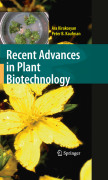
The primary purpose of this book is to tell the reader what plant biotechnology is all about – progressing from its roots in the basic sciences to its current applications in the biological and agricultural sciences, industry, and medicine. These widespread applications signal the fact that plant biotechnologyis increasingly gaining in importance. This is because it impinges on so manyfacets of our lives, particularly in connection with global warming, alternative energy initiatives, food production, and medicine. The book also addressesthe fact that some aspects of plant biotechnology may have some risks. These are covered in the last section. The individual chapters of the book are organized according to the following format: chapter title, chapter outline, introduction to the chapter, chapter topics and text, conclusions and references cited for further reading. This format is designed to help the reader grasp and understand the inherent complexity of plant biotechnology better. INDICE: Preface.- Section I Plant Biotechnology From Inception to the Present: Overview of Plant Biotechnology from its Early Roots to the Present. The Use of Plant Cell Biotechnology for the Production of Phytochemicals. Molecular Farming of Antibodies in Plants. Use of Cyanobacterial Proteins to Engineer New Crops. Molecular Biology of Secondary Metabolism: Case Study for Glycyrrhiza Plants.- Section II Applications of Plant Biotechnology in Agriculture and Industry: New Developments in Agricultural and Industrial Biotechnology. Phytoremediation: The Wave of the Future. Biotechnology of the Rhizosphere. Plants as Sources of Energy.- Section III Use of Plant Secondary Metabolites in Medicine and Nutrition: Interactions of Bioactive Plant Metabolites: Synergism, Antagonism, and Additivity. The Use of Selected Medicinal Herbs for Chemoprevention and Treatment of Cancer, Parkinson's Disease, Heart Disease, and Depression. Regulating Phytonutrient Levels in Plants -- Towards Modification of Plant Metabolism for Human Health.- Section IV Risks and Benefits Associated with Plant Biotechnology: Risks and Benefits Associated with Genetically Modified (GM)Plants. Risks Involved in the Use of Herbal Products. Risks Associated with Over-collecting Medicinal Plants in Natural Habitats. The Potential of Biofumigants as Alternatives to Methyl Bromide for the Control of Pest Infestation in Grain and Dry Food Products.- Index.
- ISBN: 978-1-4419-0193-4
- Editorial: Springer
- Encuadernacion: Cartoné
- Páginas: 404
- Fecha Publicación: 01/08/2009
- Nº Volúmenes: 1
- Idioma: Inglés
